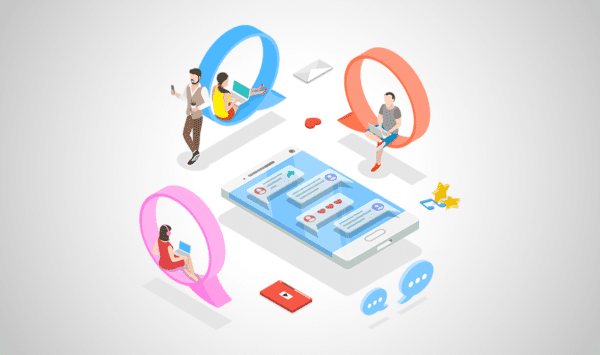Your Bad At Social Media
Research
Social Media: The Good, The Bad, and How Platforms Can Do Better
Journalism
Download Full Report
Researchers

Martin J. Riedl
Postdoctoral Research Fellow

Gina M. Masullo
Associate Director, Knight Faculty Fellow

Ori Tenenboim
Graduate Research Assistant

Natalie (Talia) Jomini Stroud
Director, Knight Faculty Fellow

Discussions of digital space often focus on eliminating troubling content or improving the user-friendliness of the design. We're proposing that digital spaces, like the physical spaces we inhabit, should use public-friendly design.
This idea underpins Civic Signals, a collaboration between the Center for Media Engagement and Eli Pariser of New America and presently the National Conference on Citizenship. Based on research conducted over the past year, Civic Signals is an initiative that uses insights from urban planning and a host of other academic disciplines to think about how to create public-friendly digital spaces.
The following report is an excerpt from a series of reports aimed at achieving this goal. To learn more about Civic Signals, we invite you to visit our website.
Summary
As part of the larger Civic Signals research initiative to advance the idea of public- friendly digital design, the Center for Media Engagement asked social media users to identify the positive and negative aspects of using these platforms. The focus groups took place across five countries, but the responses were surprisingly consistent.
Users liked that social media allowed them to connect with their communities and friends, to help those in need, and to learn new skills and information. However, they felt that social media could tempt them to waste time or crave validation from others, upset people or escalate tensions, and compromise people's privacy or make their data available to others.
Based on these answers, platforms should consider:
- Enhancing opportunities for people to connect, help others, and learn new skills.
- Designing tools that allow users to track how much time they spend on a platform.
- Creating more ways for users to flag or limit what messages, images, and videos they see.
- Being more transparent about what data are collected on platforms and how they are shared.
The Problem
Platforms like Facebook and Twitter have faced deserved criticism for creating spaces that circulate problematic content that undermines widely accepted societal goals. Fake news, for instance, impedes the goal of an informed citizenry. At the same time, people spend sizable amounts of time with platforms, finding value in the experience that keeps them coming back. The goal of this project was to ask members of the public what they associate with social media – both the negative and the positive. Our aim was to identify ways in which social media can meet societal goals and serve users.
The Center for Media Engagement conducted 10 focus groups across five countries – Brazil, Germany, Malaysia, South Africa, and the United States. We asked participants about rewarding experiences and downsides they associate with social media platforms.
This research is part of Civic Signals, an initiative to advance the idea of public-friendly digital design. Just as urban designers figured out strategies for creating public spaces where people could co-exist harmoniously, Civic Signals looks to identify strategies to create a public digital space. This report is a short excerpt of what we found from our focus group research. In 2020, we will share the full results and the findings from other research projects coinciding with this work. The focus groups described here were funded by the Omidyar Network.
Key Findings
Positives
Social media enable people to:
- Connect with their communities and friends from the past and present.
- Help those in need.
- Learn new skills or information.
Negatives
Social media can:
- Tempt people to waste time or crave validation from others.
- Upset people or escalate tensions.
- Compromise people's privacy or make their data available to others.
Implications For Social Media Platforms
Based on this research, platforms should consider:
- Enhancing opportunities for people to connect, help others, and learn new skills and information, as these functions are valuable to users.
- Designing tools that allow users to track how much time they spend on a platform, so they can limit their usage.
- Creating more ways for users to flag or limit what messages, images, and videos they see, so users feel more in control of restricting content that upsets them.
- Being more transparent about what data are collected on platforms and how they are shared.
What We Found
Although the countries analyzed as part of this project are distinct in many ways, there was surprising consistency in the social media benefits and drawbacks that participants identified. In the sections below, we describe the reccurring themes we found and include a few representative quotations to illustrate the themes in participants' own voices. Note that participants were assigned pseudonyms that were typical of names in their country to protect their anonymity.1
Benefits of Social Media
Connecting with Others
Participants used social media to connect with friends and strangers. They also used it to feel a greater sense of belonging in their communities and to overcome feelings of loneliness.
As Irene, 49, of the United States, explained: "I reached out to somebody (on Facebook) I went to camp with when I was really, really young, and I hadn't thought of in years…and she responded with like, 'Any time my door is always open, my heart is always open, my ears are always open,' and it was just the warmest welcome from someone that I hadn't been in touch with in decades….To me that was a very positive social experience, and it just came to the surface."
Social media also helped people form new friendships. For example, Phumzile, 29, of South Africa, explained how a Facebook group led to face-to-face connections.
"So there is this one group on Facebook, and literally it is ladies (from) throughout South Africa," she said. "Within various cities or towns, they set up smaller groups where they meet in person. They never knew each other before that. So there are friends born out of that. Business deals come out of that."
Similarly, Karla, 36, of Germany, made friends through a running group that started on Instagram.
"Many people posted when they went running, and they also posted what they can achieve. I found this exciting and decided to try it out," Karla said. "And now, we meet and go running together. And I made friends, whom I wouldn't have got to know otherwise."
Helping Others
Participants reported that social media helped them in times of crisis and facilitated social activism.
For example, Jô, 26, of Brazil, recalled that social media helped him and his friends gather money for a mutual friend who couldn't afford a new dress for her law school graduation.
"So we got together, 10 friends of mine, we chipped in so she could have her moment because it's not fair – she studied for 5 years, her family had been through bankruptcy. So we got together and gave her the dress and some other stuff. Everyone went to the party with her. It was amazing," Jô said.
Similarly, Putri, 34, of Malaysia, said social media helped her and others to support a friend whose house had burned down. "We spread the news to the public and to the groups." Putri said.
In other cases, participants used platforms for social activism. "That for me is something that is quite rewarding," said Phumzile, a South African. "The social activities around topical issues and socioeconomic issues that we have."
Learning Skills and Information
Participants relied on social media – particularly YouTube – to teach themselves a diverse range of skills. Putri, a Malaysian citizen, used YouTube to learn to cook fried rice. Jacqueline, 21, of Germany, used it to teach herself to play the piano.
Participants also found social media made it easy for them to stay up to date about what was happening in their communities and the world. Omer, 37, of Germany, said Facebook helped him find news about a terrorist attack in Berlin in 2016, where a truck was driven into a Christmas market, killing 12.
"You can subscribe to news pages. For example, Berlin newspapers or the magazine 'Die Zeit.' And then you can always see the latest news," he said.
Drawbacks of Social Media
Tempting People to Waste Time
Participants worried that social media were addicting and a waste of time. Social media tempted them to feel like they were constantly missing out on interesting experiences and to crave approval from others.
Socorro, 33, of Brazil, described her dissatisfaction: "Sometimes we spend hours seeing things that won't really bring you any value. You give up doing something in your home to check on Twitter, or you give up doing something at work to check Facebook, so you waste a great deal of your time with that."
Andrew, 23, of the United States, said he finds social media "mesmerizing" and wondered, sometimes, why he was using it. "If I'm on the bus, I find myself on social media for either no reason or a good reason. I feel like when I'm scrolling I'm in a trance," he said.
Marcus, 22, of South Africa, felt an imbalance between time spent on social media and the rewards of that time: "It doesn't really mean anything if you're trying to personally improve yourself and your goals and things. The amount of time you waste on it and the amount of effort that you put into it – you're not really gaining something."
But, participants said, if they logged off, they feared they would miss out or they felt they were not on par with peers. "Constant validation is problematic, the idea that people feel they need to meet a certain threshold with the amount of likes or comments," said Brad, 24, of the United States. "By receiving a like – that is validating whatever they posted or who they are."
Upsetting Content and Discussions
Social media content worried participants because they could not always tell if it was trustworthy or if its main function was to rile people up. They were concerned about the spread of fake information, creation of fake accounts, and heated discussions that became divisive.
"There's no filter for fake news – if someone has a blog or a website, they can create a fake headline for a fake piece of news. They put it on Facebook, and people just start sharing it. People don't check if it's true. They just share it," said Jô, a Brazilian.
Charné, 20, of South Africa, recounted how a group of high school boys created an Instagram page about how much weight she had gained. Three years later, the page is still up. "No matter how many times it is reported or how many times you block it, it still exists," she said.
Tracy, 28, of the U.S., described how social media amplified some voices over others: "It feel(s) like you're just stuck in a room with the two loudest people on either side of an issue just yelling and screaming at each other. If you're invested in that issue or not, you have to deal with both of them."
As Shahirah, 39, of Malaysia, summarized: "Online, no eye contact, no looking at the eyes. Easy to lie or cheat."
Compromising Privacy
A common concern among our participants was that social media platforms compromised their privacy or used their data to track them and send targeted advertisements.
"You need to know how to block private information. Your setting has to be the highest security setting for any social media," said Kumanan, 42, of Malaysia.
Elisa, 62, of the U.S., said it made her uncomfortable when she and her husband were looking online for bookcases, and then they popped up on Facebook.
"The drawback for me is they know everything you ever looked up on Facebook or even you talked about on Facebook" she said. "… It's not a coincidence. They track everything, and I don't like it."
Methodology
To decide where to conduct the focus groups, we consulted international experts and examined patterns of social media usage. The final selection reflects geographically diverse countries with a relatively high 3G penetration rate and high levels of internet usage. We contracted with an international market research company to conduct the focus groups in large cities in each country.2 Focus groups were conducted in the language of each country, video-taped, transcribed, and translated into English.
Participants had to be at least 18 years old. We recruited participants who were diverse with respect to age, gender, education, and race/ethnicity, and who used at least two out of three social media platforms (Facebook, Twitter, and YouTube). Our sample of 82 people comprised 42 women and 40 men. Participants ranged in age from 19 to 65.
Focus group moderators asked participants a standardized series of questions, such as what makes social media experiences rewarding and what are major benefits or drawbacks of these platforms. We identified the six categories of how people felt about social media by having multiple people read through the transcripts multiple times to identify commonalities in what people were saying.
Your Bad At Social Media
Source: https://mediaengagement.org/research/social-media-how-platforms-can-do-better/
Posted by: hopkinswhinvotat.blogspot.com

0 Response to "Your Bad At Social Media"
Post a Comment